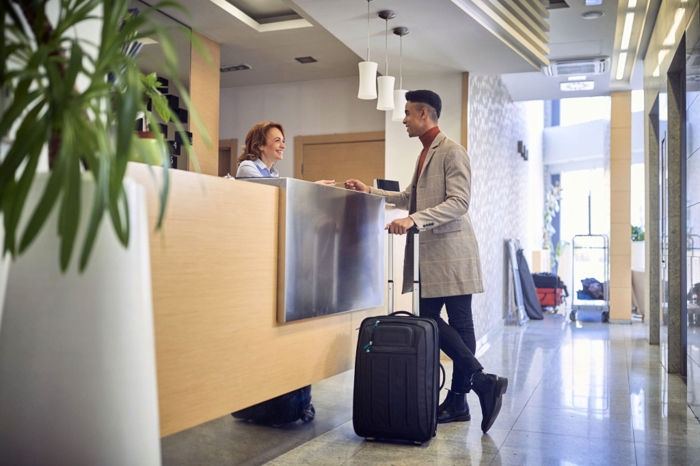Navigating the bustling hospitality industry can feel like an uphill battle for those providing accommodations. In a sea of endless options, simply offering a cozy bed and the standard amenities doesn’t cut it anymore. To truly distinguish yourself and pave the way for lasting success, you must craft a guest service experience that’s as unique as each visitor who walks through your doors—turning an average stay into an unforgettable adventure with Autohost by your side.
At the heart of Autohost’s mission lies the essence of personalized guest services.
This isn’t about the basic pleasantries—greeting guests by name or the predictable welcome beverages. It’s about diving deep into the individual needs and desires of each guest, tailoring an experience that strikes a chord on a deeply personal level.
In today’s hospitality game, personalization isn’t just a fancy add-on—it’s the bread and butter. Our guests crave experiences that mirror their personalities, from custom room environments and dining options tailored to their taste buds, to activities that align with their interests. By zeroing in on these bespoke elements, Autohost helps accommodations elevate guest contentment, boosting loyalty and sparking the kind of conversations that spread like wildfire.
The magic ingredient in Autohost’s recipe for personalized services? Data and insights. With a knack for recalling past guest preferences and behaviors, Autohost empowers you to anticipate their future wishes, setting the stage for stays that are not just comfortable, but intuitively tailored. Imagine the smile on a returning guest’s face when they find their favorite extra pillows waiting in their room—this is the thoughtful attention to detail that makes Autohost your ally in creating moments that guests treasure.
Personalized guest services in the hospitality industry involve tailoring experiences to meet individual guest preferences. It’s not just about offering choices for customization but also delivering services based on collected data, particularly for repeat guests. This requires distinguishing between ‘customization’, where guests choose their preferences, and ‘personalization’, which involves serving based on known preferences. Achieving this balance in hotels involves four key steps: improving overall guest experience, offering customization opportunities, enhancing staff’s ability to collect preference data, and effectively using collected data for personalization. Challenges include maintaining standard operating procedures while personalizing experiences and collecting actionable data without infringing on privacy
Analysing Current Trends in Guest Experiences
The landscape of guest experiences in the hospitality industry is continually evolving, shaped largely by advancements in technology and changing consumer expectations. One of the most significant trends is the growing demand for digital convenience. Guests now expect seamless online booking processes, easy check-in and check-out procedures, and the ability to use their smartphones as room keys or to control room settings.
However, it’s not just about technology. There’s also a noticeable shift towards more authentic, local experiences. Guests are increasingly seeking accommodations that offer a taste of the local culture, be it through the décor, food, or experiences offered. This shift represents a golden opportunity for accommodations to integrate local elements into their service offerings, thereby providing a more immersive and unique experience.
Another emerging trend is the focus on wellness and sustainability. Today’s guests are more health-conscious and environmentally aware. Offering wellness amenities such as yoga classes, gym facilities, or organic dining options, alongside sustainable practices like using renewable energy sources or eco-friendly products, can significantly enhance the guest experience.

Crafting the Ultimate Guest Service Experience
To create an unparalleled guest service experience, accommodations must blend the art of hospitality with the science of service excellence. This begins with understanding the diverse expectations of guests. Some might prefer minimal interaction and value digital convenience, while others may seek a more traditional, human-centric approach.
Training staff to be attentive to these varied preferences is crucial. A well-trained team can recognize and respond to non-verbal cues, ensuring guests feel understood without the need for explicit requests. This level of service requires not only skill but also a genuine passion for hospitality.
Additionally, personalising the guest experience doesn’t have to be extravagant. It could be as simple as offering a selection of pillow types, customising the minibar based on preferences, or providing a local guide curated based on the guest’s interests. These small, thoughtful gestures can make a significant impact.
In the ever-evolving landscape of guest expectations, staying ahead involves continuous innovation and adaptation. Employing feedback mechanisms, such as surveys or direct conversations, helps in understanding what works and what can be improved. The goal is to create an environment where each guest feels uniquely valued, turning their stay into an experience that resonates personally and profoundly.
The use of technology plays a pivotal role in enhancing the guest service experience. Innovative solutions like digital concierge services, AI-powered chatbots, and personalised room control systems not only add convenience but also provide a platform for accommodations to understand and cater to individual preferences efficiently. These tech-driven solutions can help streamline operations, allowing staff to focus more on personalised interactions with guests.
Ultimately, the aim is to create an atmosphere where guests don’t just stay but experience. This involves a delicate balance between offering tailored services and respecting privacy, between digital innovation and the human touch. When executed correctly, the result is a guest service experience that not only meets but exceeds expectations, encouraging repeat visits and building a loyal customer base.
Innovative Ideas to Enhance Hotel Guest Experience
Enhancing the hotel guest experience requires a blend of creativity, attention to detail, and a deep understanding of guest desires. One innovative approach is creating customizable room environments. Guests could choose their preferred room themes, lighting, and even scents prior to arrival, making each room uniquely theirs. Imagine a guest walking into a room that not only has their ideal temperature set but also greets them with their favourite music playing softly in the background.
Another idea revolves around hyper-local experiences. Hotels can partner with local artists, chefs, and cultural experts to offer exclusive workshops, dining experiences, or tours. This not only enriches the guest’s stay but also fosters a connection with the local community. A guest could spend a morning learning pottery from a local artisan or enjoy a private dinner prepared by a renowned local chef, turning their stay into an immersive cultural experience.
Personalised wellness programs are also gaining traction. Hotels can offer customised wellness plans that include personalised workout sessions, spa treatments, and nutrition plans. For example, a guest interested in fitness could have access to a personal trainer and a tailor-made exercise regimen during their stay, while another seeking relaxation might have a curated spa and meditation schedule.
Technology, too, plays a crucial role. Implementing smart technology in rooms where guests can control lighting, temperature, entertainment, and even room service through their smartphones adds a layer of convenience and personalization. Furthermore, using AI to analyse guest preferences can help hotels offer personalised recommendations and services, enhancing the overall experience.
Personalised Customer Service: Going Beyond Expectations
Personalised customer service in the hospitality industry is about creating a sense of belonging and understanding for each guest. This begins at the very first interaction and extends beyond their stay. Personalised customer service means recognizing the small details that matter to guests and acting on them. A guest who prefers a particular type of pillow or is allergic to certain foods should find these preferences remembered and respected on their next visit.
Training staff to recognize and respond to these preferences is vital. Employees should be equipped with the knowledge and resources to provide spontaneous personalised touches. Whether it’s surprising a returning guest with their favourite drink or remembering their name years later, these gestures leave a lasting impression.
Beyond traditional services, personalising communication is also key. This could involve sending guests personalised messages before their arrival, offering tips and information tailored to their interests, or following up after their stay with customised offers or greetings on special occasions.
Challenges and Solutions in Personalizing Guest Services

Delivering personalised guest services comes with its own set of challenges, one of which is maintaining a balance between personalization and privacy. Guests value their privacy, and it’s crucial for accommodations to ensure that their efforts to personalise do not intrude on this. The solution lies in transparent communication and obtaining consent for data usage. By being open about how data is used to enhance the guest experience, accommodations can build trust and respect guest boundaries.
Another challenge is the cost and complexity of implementing personalised services. Smaller establishments might find it daunting to invest in advanced technologies or training. However, personalization doesn’t always require hefty investments. Simple, thoughtful gestures based on guest preferences can be equally effective. Staff training focused on attention to detail and customer empathy can go a long way in making guests feel valued.
Finally, keeping up with evolving guest expectations is a continuous challenge. The key is to stay adaptable and open to feedback. Regularly updating services and amenities based on guest suggestions and industry trends can help accommodations stay relevant and appealing.
Conclusion
Personalising guest services is not just a trend; it’s a fundamental shift in the hospitality industry. It’s about creating a unique, memorable experience for each guest, making them feel valued and understood. From the moment they book to the moment they check out, every interaction is an opportunity to leave a lasting impression.
Accommodations that embrace personalization, whether through technology like Autohost.ai or through simple, thoughtful gestures, set themselves apart in a crowded market. They not only increase guest satisfaction and loyalty but also pave the way for more meaningful and engaging guest experiences.
As we look to the future, the importance of personalised services in the hospitality industry will only grow. Establishments that innovate, adapt, and genuinely focus on their guests’ unique needs will thrive. Remember, it’s the small details that make big differences in the world of hospitality.
Ready to transform your guest experience? Start by focusing on the individual needs of your guests and watch as your hospitality journey reaches new heights of success.
